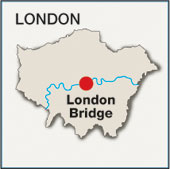Crossings
AFTER THE London Bridge attacks, I felt a vicarious survivor's guilt - not because I narrowly got away, but because I spent six years living near Borough High Street where Muslim youths drove into random pedestrians. I had a similar, though less intense, feeling after the Mumbai attacks, because I once ate at the Leopold Café. It's eerie sharing a zip code with the dead.
In my medical school, a stone's throw from London Bridge, I saw the Islamic society change from a religious organisation - which welcomed Hindus and Muslims, alike - to a political organisation. I'd attend Islamic society meetings because of tasty food, particularly during Ramzan, and robust discussions about God's existence.
After the civil war in Bosnia, the organisation became political, which I first noticed when Muslim students, believing I was Muslim, asked if I'd join them to protest the destruction of the mosque in Ayodhya by Hindu fanatics. The discussions in the Islamic society meetings no longer were about Thomas Aquinas and the logic of God, but Kashmir, Palestine, Chechnya, Bosnia, the American presence in Saudi Arabia and restoration of the Caliphate. The change was, in part, inspired by the Hizb ul-Tahrir (HT), a movement which gripped many Muslim students, particularly from the subcontinent. The HT neither condoned nor condemned terrorism but wanted a global caliphate.

After the July 7 London attacks, a trainee journalist, Dilpazier Aslam, wrote provocatively in The Guardian - "We rock the boat" - explaining why second-generation Muslims in Britain won't abide injustices on Muslims. The piece, disagreeable but well-written, achieved what every writer should aspire to - which is to get under people's skins. A blogger found that Aslam was a member of the HT. Because Aslam refused to disown the HT, he lost his training position with the prestigious newspaper.
I confess to admiring Aslam. He stood up for his convictions. Aslam was a face of Britain's political Islam - angry, unapologetic, yet not in the fringe.
There were calls to ban HT. A former member, Ed Hussain, left HT because the anger and hatred eventually got to him.
I never shed a tear for HT because I saw many Muslim friends transform from the spiritual to the political after joining it. However, the marginalisation of HT was a public policy own goal. The anger vacuum created by marginalising the HT, and similar organisations, was filled by the lowest bidder - the ISIS. Whereas, once, angry Muslims youths congregated in mosques, community centres, gyms and college common rooms, they now watch preachers on YouTube, seek marginalised Internet sites, and meet in small groups. The classroom has been flipped. The safety in numbers has been demolished.
The trend reflects a larger problem in our Godless hyperrational times, in which secularists believe they can educate or shame people out of bigotry and radicalism into enlightenment. This would be easy were religion the major motivator. But religion is often a red herring in the complex interplay between existential angst, ressentiment, and real and perceived injustices.
Now there's no superstructure - no al Qaida - for counterintelligence to target, just a dispersed Freudian Id. It's pointless blaming Muslim communities, hardly a monolith, because not even the parents of the radicals are aware when and how they're radicalised.
The trend is concerning because, to paraphrase the American National Rifle Association, if you outlaw radicals only outlaws become radicals. The new radicals are dispersed agents - their inspiration is random, their targets random, and methods more primitive than Hoplites. They act, not from central command, but their initiative. Their angst, once nurtured curiously in pedagogy, is unmoored, hedonistic and nihilistic. This is free market terrorism. Be very afraid.
Saurabh Jha

